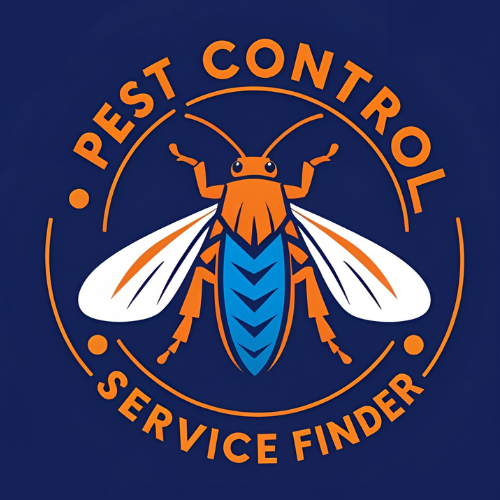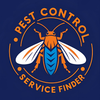Find Pest Control Services Near Me
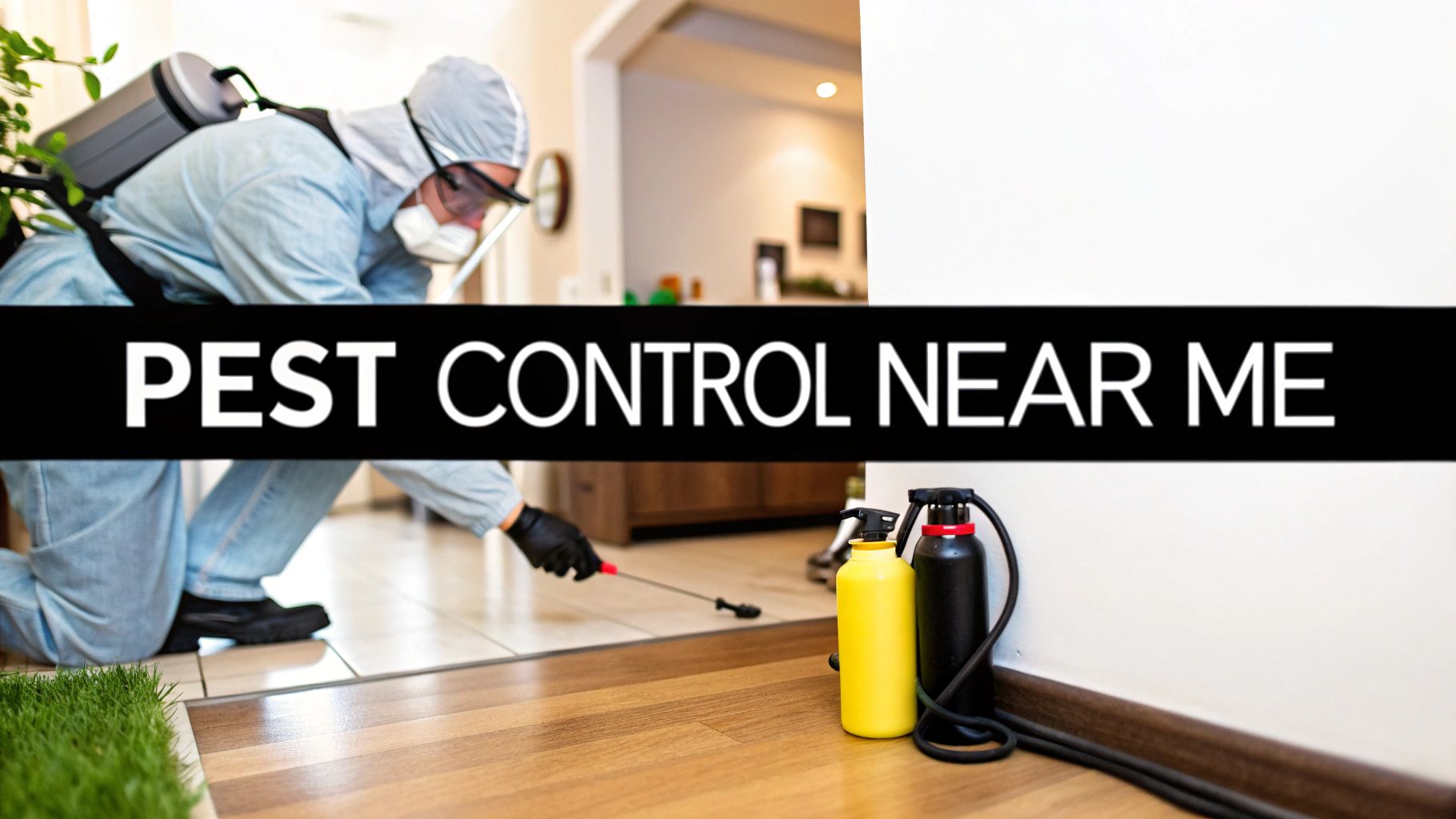
Dealing with pests? The first and most important step is to call +1 855 224 3071 for immediate, professional help. When you find pests, stress is immediate. That initial shock of seeing a mouse scurry across the floor or a roach on the counter can send you into a panic, but what you do next really matters.
What to Do When You First Spot Pests
It's that heart-sinking moment when you realize you're not alone. The key is to stay calm and be methodical. This isn't the time for a frantic DIY spray-down—that often just sends pests scattering into deeper hiding spots and can make a professional's job harder. For immediate guidance on what to do, call +1 855 224 3071.
Instead, take a breath and become an observer.
Assess the Situation Safely
Your first instinct might be to squash, spray, or sweep away the evidence. Hold off. A quick, safe assessment gives a professional exterminator a huge head start. You don't need to be an insect expert, but a quick photo from your phone or a simple description can make all the difference. Is it a big, black ant or a smaller, reddish one? That detail alone can distinguish a common nuisance from a wood-destroying carpenter ant problem.
Next, play detective and look for signs that this isn't just a one-off visitor.
- Droppings: Tiny, dark specks in cupboards, under the sink, or along baseboards are the calling cards of rodents and roaches.
- Nests: Look for piles of shredded paper, fabric, or insulation tucked away in quiet corners. That's a classic sign of a rodent nest.
- Damage: Are there gnaw marks on cereal boxes? Tiny, unexplained holes in wooden trim? That's clear evidence of rodents or even termites.
Knowing this helps a pro understand the scale of the infestation before they even walk through your door. For a deeper dive on why certain pests show up, check out our guide on reasons you might have cockroaches in your house.
Preparing for Your Call
The more information you have, the faster you can get effective help. When facing an emergency, the fastest way to get help is by finding pest control services near me through a trusted network of vetted professionals. Before you call +1 855 224 3071, it's smart to have a few key details ready. This helps the pest control company give you a much more accurate assessment right from the start.
To make this super simple, here's a quick checklist to run through the moment you discover a problem.
Your First-Response Pest Checklist
| Action | Why It Matters | Insider Tip |
|---|---|---|
| Identify the Pest (or Take a Photo) | Different pests require completely different treatment plans. | Even a blurry photo is better than nothing. Note the pest's size and color. |
| Pinpoint the Location | Knowing where you saw them helps pros find the source of the infestation. | "Under the kitchen sink" is much more helpful than just "in the kitchen." |
| Note the Time of Day | Many pests are nocturnal. Seeing them in the daytime can indicate a larger problem. | Seeing a cockroach during the day often signals a heavy infestation. |
| Look for Evidence (Droppings, Damage) | This helps determine how long the problem has been going on. | Take pictures of droppings or damage to show the technician. |
| Keep Pets and Children Away | Your family's safety is the top priority. Secure the area until a pro arrives. | Close the door to the room if possible to contain the situation. |
Having these details on hand turns a panicked phone call into a productive consultation. When you're ready for professional, immediate help, call +1 855 224 3071.
This visual shows you exactly what to expect from a professional service—it's a clear, structured process.
As you can see, real pest control isn't just about spraying and leaving. It's a cycle of inspection, customized treatment, and crucial follow-up to make sure the problem is gone for good.
How to Vet Local Pest Control Companies
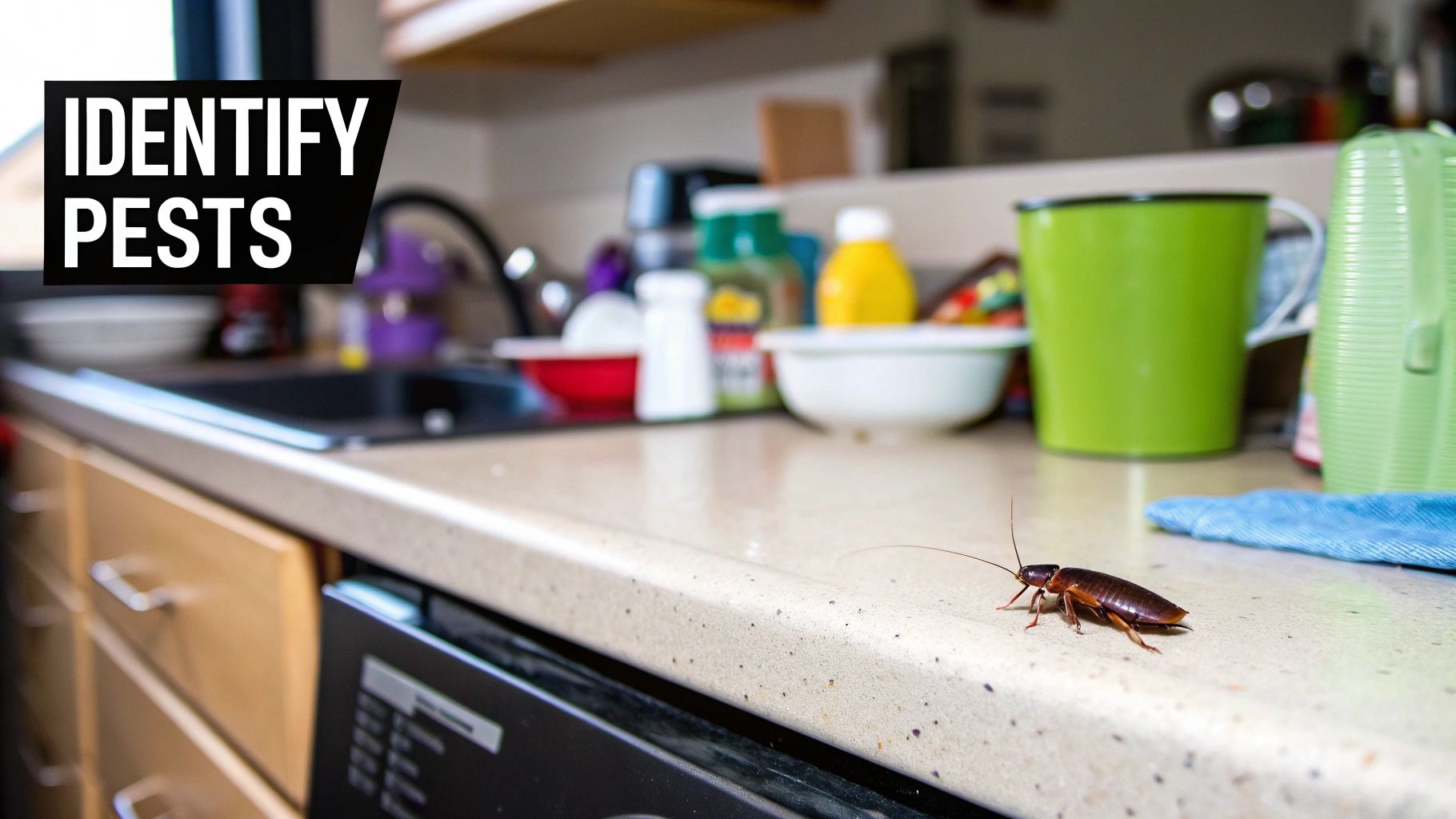
Finding a local exterminator is easy. Finding the right one to trust with your home and family's safety? That's a different story.
Putting in a little effort now will save you from major headaches down the road. Before choosing a national brand, many homeowners prefer to locate pest control services in your area to find local specialists. If you want expert help sorting through your options, our specialists are ready to connect you with vetted pros when you call +1 855 224 3071.
Remember, not all exterminators are created equal. You're looking for a company that is not just effective but also properly licensed, insured, and has a solid reputation. This is about protecting yourself from liability and making sure you get the quality service you're paying for.
Start with Licenses and Insurance
This is the absolute first thing you should check, and it's non-negotiable. Any legitimate pest control company must hold a license from your state's agricultural department or a similar regulatory board.
This license isn't just a formality. It means the technicians have passed exams and are trained on how to apply pest control treatments safely and correctly.
Next, you need to confirm they have general liability insurance and workers' compensation. Liability insurance is what protects your property if something goes wrong. Say a technician accidentally damages your hardwood floors during a treatment—their insurance should cover the repair costs.
Don't ever skip this step. Without proper insurance, any accidents or injuries that happen on your property could become your financial problem.
Learn to Read Between the Lines of Online Reviews
Online reviews are a goldmine of information, but you have to know how to dig. Don't just glance at the star rating on Google, Yelp, or Angi and call it a day. Dive into the actual comments.
You're looking for patterns. Are multiple customers raving about a technician named Bob and his thorough work? Or are there repeated complaints about the same pests showing up a week after treatment? These details tell you way more than a simple five-star score.
Be skeptical of reviews that are super generic ("Great service!"). Real, genuine feedback usually includes specifics—the type of pest, where the problem was, and how the service turned out.
If you're getting overwhelmed trying to separate the real from the fake, a quick call to +1 855 224 3071 will connect you with pros who have already been checked out. For comprehensive coverage, connect with vetted pest control services in your region through our referral network.
Know What to Ask on the Phone
That first phone call is your chance to interview the company. Access to reliable pest control services nearby ensures you can get same-day treatment when pests strike. A truly professional outfit will be patient and happy to answer your questions without rushing you off the phone. Call +1 855 224 3071 to speak with a customer service expert now.
Here are a few questions I always recommend asking:
- Get Specific About Your Pest: Instead of asking, "Do you handle roaches?" try something like, "How much experience do your technicians have with German cockroaches in multi-unit apartment buildings?" The more specific you are, the better you can gauge their expertise.
- Ask About Their Treatment Methods: A great question is, "What kind of treatments do you recommend for this issue, and are they safe for my pets and kids?" This opens up the conversation about their approach and whether they use family-friendly options like Integrated Pest Management (IPM).
- Inquire About Guarantees: Always ask, "What kind of guarantee do you offer if the pests come back after you leave?" A reputable company will stand by its work and should be able to clearly explain what their follow-up policy includes.
Understanding Pest Treatments and Safety
For expert guidance on your specific treatment options and how to keep your home safe, call +1 855 224 3071 right away. When you bring in a professional, you're not just paying for a quick spray. You're investing in their expertise on which methods actually work and—most importantly—which ones are safe for your family and pets.
There's no such thing as a one-size-fits-all solution in pest control. A pro will look at your specific situation—the type of pest, how bad the infestation is, and your household's needs—before ever recommending a treatment plan. This ensures the job gets done right while keeping any risks to a minimum.
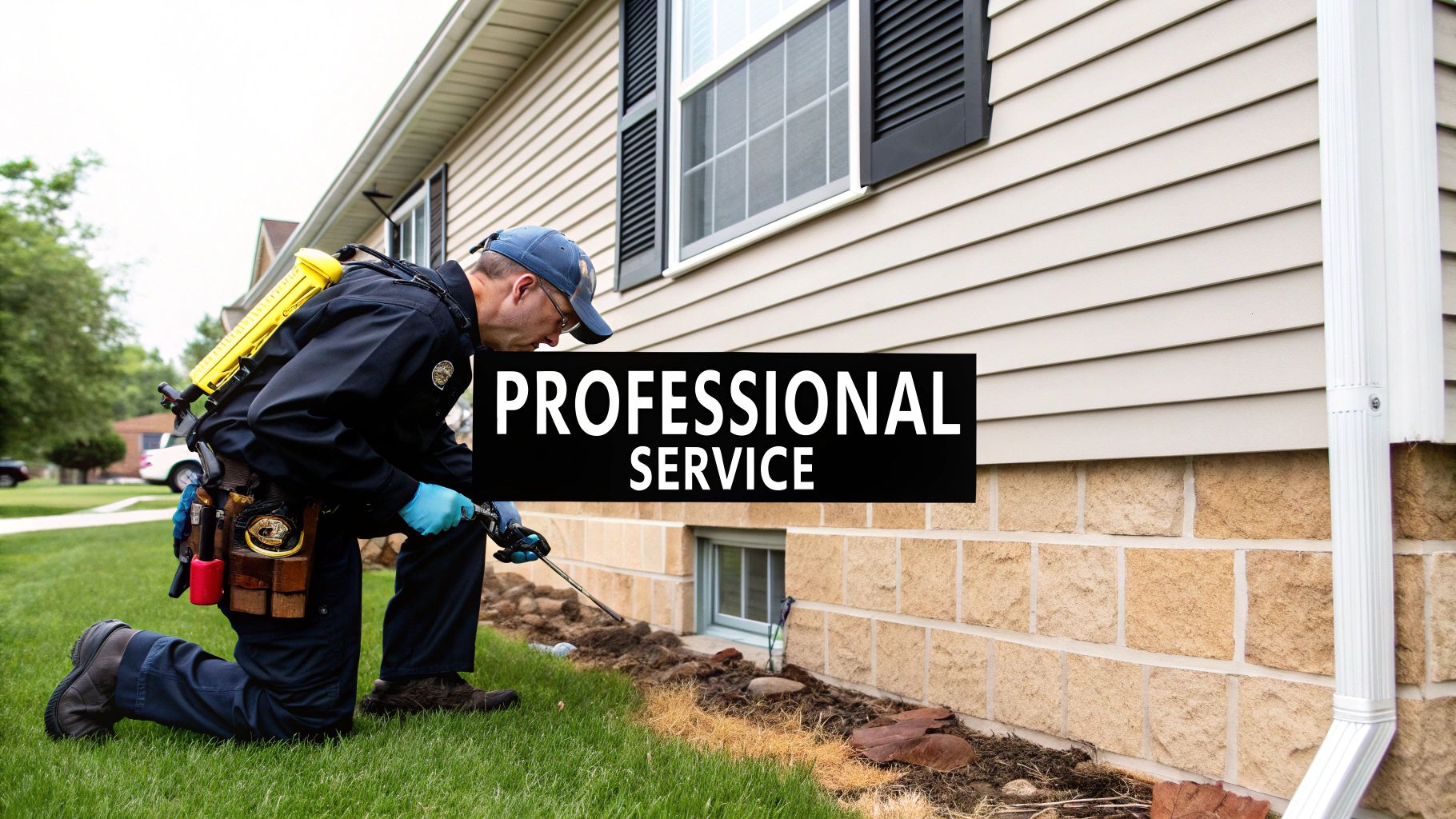
This thoughtful, tailored approach is a big reason the pest control market is booming. We're seeing a huge shift toward smarter, eco-friendly solutions as people become more concerned about health and the environment. The industry was valued at nearly USD 26.7 billion in 2024 and is expected to hit around USD 40.3 billion by 2032. That growth tells you one thing: homeowners want smarter, safer pest management.
Common Treatment Approaches
Knowing the different strategies helps you ask the right questions. A good technician will always walk you through their plan, but it never hurts to understand the basics yourself.
- Integrated Pest Management (IPM): This is the modern, holistic way to handle pests for the long term. Instead of just reaching for the chemicals, IPM focuses on the pest's life cycle. It's a mix of common-sense methods like sealing entry points, getting rid of food sources, and only using targeted, low-toxicity treatments when absolutely necessary.
- Targeted Chemical Treatments: Sometimes, you need a direct approach. The good news is that modern pesticides are more precise than ever. When natural solutions aren't enough, explore professional pest control options near you for safe, effective treatments. Professionals use products designed for specific pests, applying them in exact locations like inside wall voids or deep in cracks where they'll be effective but stay out of reach of kids and pets. For more on this, check out our guide on choosing a safe indoor insect spray.
- Heat Treatments: This is a powerful, chemical-free option that's a go-to for tough pests like bed bugs. Professionals use specialized equipment to crank up the temperature in a room to a level that kills both the pests and their eggs.
A key sign of a trustworthy company is their transparency. They should clearly explain the treatment they recommend, why it's the best choice for your situation, and what you can expect during and after the service. No secrets, no surprises.
Prioritizing Your Family's Safety
Your number one concern is safety, and a true professional shares that priority. Before they start any work, they should give you clear, easy-to-follow instructions.
This usually covers whether you need to leave the house during the treatment (and for how long) and how to properly air out the area afterward. If you have any questions or feel unsure, just call +1 855 224 3071. We can connect you with providers who make safe practices their top priority.
How to Compare Quotes and Service Contracts
If you're staring at a confusing estimate and need a second opinion, don't hesitate to call +1 855 224 3071 for clear, professional advice. Getting a few different quotes for pest control is always a good move, but the real trick is knowing how to read between the lines. To compare pricing accurately, you'll need to find qualified pest control near you and request multiple estimates. A good proposal is way more than a price tag—it's a direct reflection of a company's expertise and professionalism.
It's easy to get drawn in by the lowest price, but that rock-bottom number can sometimes hide incomplete work, cut corners, or nasty surprise fees down the road. A truly professional quote should be a crystal-clear document, leaving no room for guesswork. It should feel less like a sales pitch and more like a battle plan designed specifically for your pest problem.
The key is to look past the total cost and dig into what you're actually getting for your money.
What Every Good Quote Includes
Any legitimate quote from a pest control service will be detailed and totally transparent. If you see vague descriptions or fuzzy language, consider it a major red flag.
Here's a quick checklist of what to look for on every proposal you get:
- A Detailed Scope of Work: The quote needs to name the target pest and list every single area of your home they plan to treat. For example, "treating German cockroaches in the kitchen, specifically under sinks, behind all major appliances, and inside wall voids."
- Specified Treatment Methods: It should clearly state what products or techniques they'll be using. Are they planning on using baits, sprays, dusts, or some combination? You have a right to know.
- Clear Cost Breakdown: A good quote separates the costs for labor, materials, and any one-time setup fees. This transparency shows you exactly where every dollar is going.
- Follow-Up Plan: What's the plan after the initial service? The proposal must outline any scheduled follow-up visits and explain what will happen during them.
If a quote is missing any of these key pieces, you need to ask why. If the answers are still murky, it's probably time to walk away or call +1 855 224 3071 to connect with a pro who believes in transparency.
One-Time Service Versus a Recurring Plan
Another huge point of comparison is how the service is structured. Most companies offer a one-time treatment for a specific, isolated issue or an ongoing service contract for preventative maintenance.
A one-time service is perfect for a single, contained problem, like getting rid of a wasp nest on your porch. But for pests that are known to be persistent in your area—think ants or cockroaches—a recurring plan often provides much better long-term value and, more importantly, peace of mind. These plans typically include quarterly or bi-monthly visits to reinforce protective barriers and stop new infestations before they even get started.
When you're comparing service contracts, pay close attention to the guarantee. Does it include free re-treatments between scheduled visits if pests show up again? A solid guarantee is a sign that the company stands behind its work and is truly committed to keeping your home pest-free.
Ultimately, the choice between a one-off service and a long-term contract comes down to your specific pest problem, your property, and your personal tolerance for risk. Making the right call ensures you're partnering with someone focused on a lasting solution, not just a quick, temporary fix.
Preparing Your Home for the Exterminator
Before your pest control service arrives, it's a good idea to call +1 855 224 3071 to run through any last-minute questions about prep. What you do in the hours leading up to their visit is honestly one of the biggest factors in a successful treatment. Proper preparation starts with choosing local pest control services that have strong reviews and transparent pricing. Proper prep work gives technicians a clear shot at critical areas, keeps your family safe, and makes the products they use far more effective.
Think of it as setting the stage. When a pro can easily get to baseboards, wall voids, and the backs of closets without having to move a mountain of stuff, their job becomes exponentially easier—and the results are better. A cluttered space doesn't just get in their way; it can give pests new places to hide, which might limit how far the treatment can reach.
Getting your home ready is a team effort, and it's a reflection of the growing demand for professional, comprehensive solutions. The global pest control market is expected to jump from USD 26 billion in 2025 to roughly USD 53.1 billion by 2035. A huge chunk of that—47%, in fact—comes from commercial clients like hotels and hospitals, which really shows how critical professional standards are for every job.
Room-By-Room Preparation Guide
Every home is different, but a few general rules apply almost everywhere. The main goal is to create clear, accessible pathways for the exterminator to do their work.
- Kitchen and Pantry: Get everything off the countertops. All food, dishes, and utensils need to be stored away in sealed cabinets or moved to another room entirely. It's also smart to pull big appliances like the fridge and stove about a foot away from the wall.
- Bedrooms and Living Areas: Scoot furniture away from the walls to expose the baseboards. Make sure to clear out the floors of your closets so the technicians can treat every inch of the space.
- Bathrooms: Empty out the cabinets under the sink. This is a five-star resort for pests like cockroaches and silverfish, so making sure it's accessible is a must.
For a more detailed checklist broken down by pest, check out our guide on how to prepare for pest control.
Special Considerations for Pets and Sensitive Items
Your family's safety—including the furry, feathered, or finned members—is always the top priority.
If you have pets, you'll need to arrange for them to be out of the house during the service and for a few hours after. Your technician will give you a specific timeframe. For fish tanks, turn off the air pumps and cover the top securely with plastic wrap. This stops any airborne particles from getting into the water.
It's worth remembering that once the immediate pest problem is solved, proactive maintenance is your best defense. The importance of regular property maintenance can't be stressed enough—it tackles the conditions that invite pests in the first place, making the exterminator's work last much longer.
Taking these prep steps ensures the whole process is smooth, safe, and as effective as possible. If you're ever in doubt about what to do, just give us a quick call at +1 855 224 3071 for clear instructions.
Common Questions About Local Pest Control
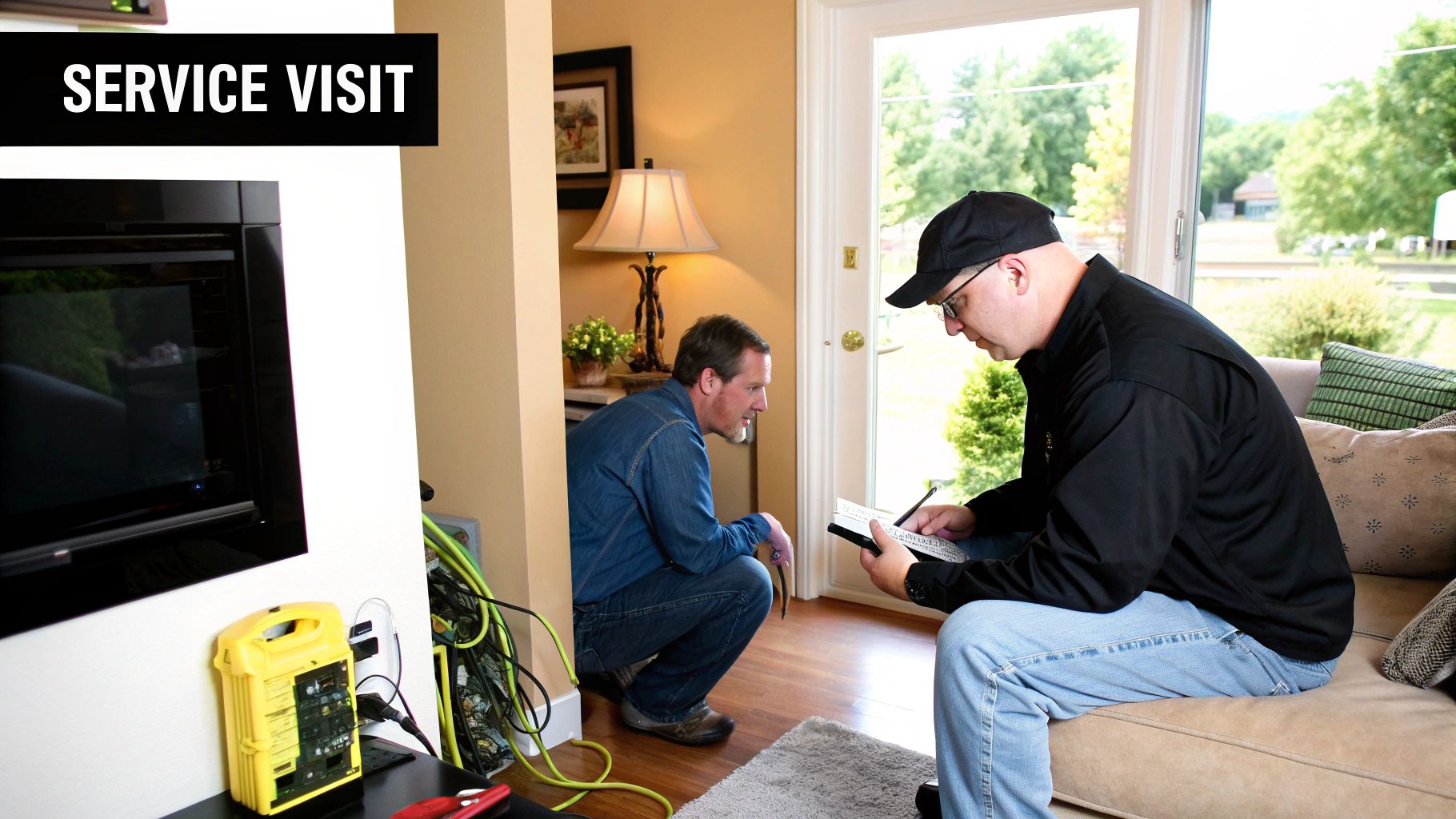
When you start looking for a local exterminator, you're going to have questions. It's only natural. For quick, personalized answers from an expert, you can always call us directly at +1 855 224 3071.
In the meantime, we've put together some of the most common things homeowners ask when they're staring down an infestation. Getting straight answers is the first step toward taking back control of your home.
How Much Should Pest Control Cost
This is the big one, isn't it? The honest answer is that it really depends. A single, one-time service could be anywhere from $150 to over $600.
What causes that big range? It comes down to a few key things: the type of pest, the size of your property, and just how bad the problem has gotten. Tackling a few ants in a small apartment is a completely different ballgame than eliminating a massive termite colony in a large house. The only way to get a real number is to get a detailed, no-obligation quote by calling +1 855 224 3071.
One-Time Treatment or Ongoing Plan
Deciding between a one-off service and a regular plan comes down to your specific problem. A one-time treatment is perfect for an isolated issue—think a single wasp nest you discovered on the eaves. The goal is to solve that one specific, immediate threat.
But if you're battling pests that are known for coming back, like ants, roaches, or spiders, an ongoing service plan is usually the smarter move. These plans typically include quarterly visits to maintain a protective barrier around your home, stopping pests before they ever get inside.
If you're unsure which route to take, give us a call at +1 855 224 3071, and we can help you figure it out.
Choosing an ongoing plan is about shifting from a reactive approach to a proactive one. It's not just about getting rid of the pests you see now; it's about ensuring you don't have to deal with them again in a few months.
Are Pet-Safe Options Really Effective
Yes, absolutely. Modern pest control has made huge leaps, and today's professional-grade, eco-friendly products are incredibly effective without putting your furry family members at risk.
Companies that prioritize safety often use an approach called Integrated Pest Management (IPM). This means they aren't just spraying chemicals everywhere. Instead, they use targeted treatments, applying products precisely in the cracks, crevices, and wall voids where pests hide and breed—places your pets and kids can't get to. For severe infestations, local pest control experts have access to professional-grade treatments unavailable to consumers. For information on pet-safe options, call +1 855 224 3071.
What if Pests Come Back
It's a fair question. You're paying for a solution, and you want it to last. That's why you should always ask about a service guarantee before booking.
Any reputable pest control company will stand behind their work. For a one-time treatment, this usually means if pests return within a specific window (often 30-90 days), they'll come back and re-treat the area for free. With ongoing plans, re-treatments between your scheduled visits are almost always included. If you spot a pest, you just call them, and they'll send a technician right back out.
For questions or to book a service that comes with a solid guarantee, call us at +1 855 224 3071.
For fast, reliable connections to vetted, local exterminators ready to handle any pest problem, trust Pest Control Service Finder. Get your no-obligation quote and schedule same-day service by visiting us at https://pestcontrol-service-finder.com.
